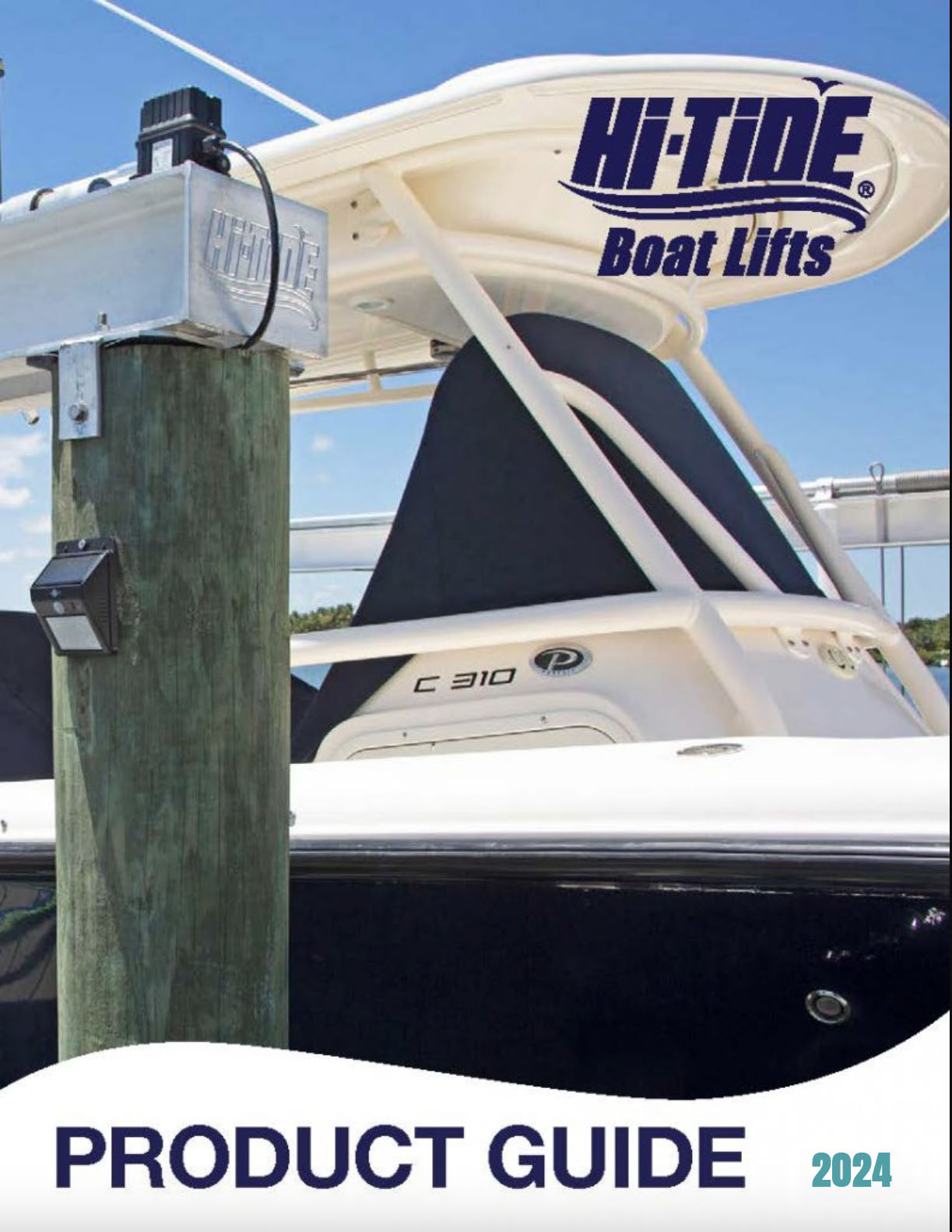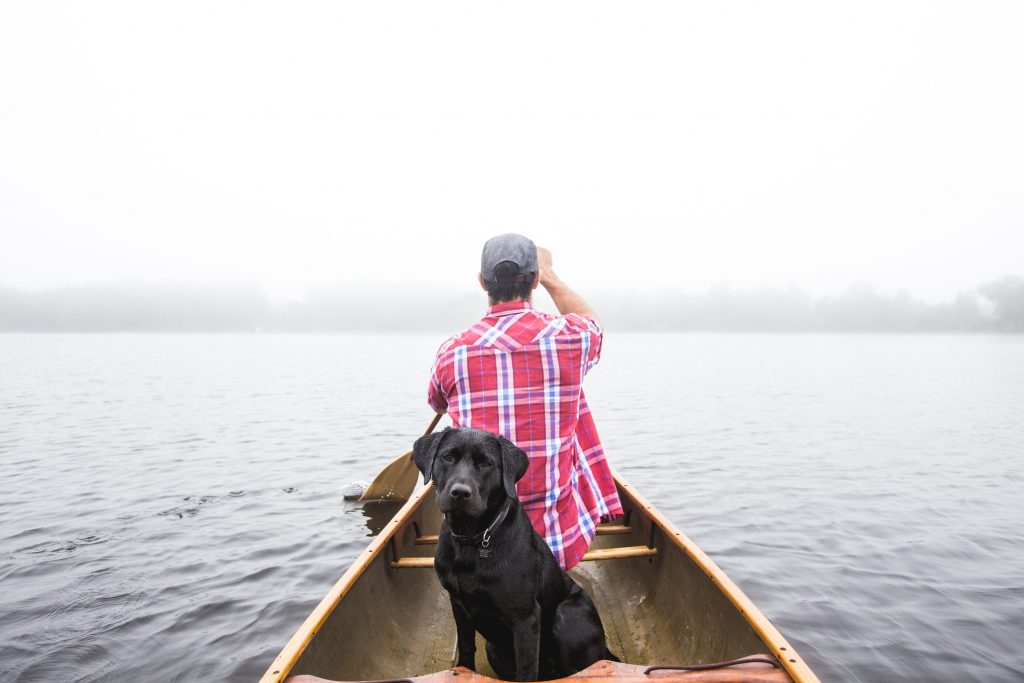
When on the water, you want to know someone’s got your back. Conditions can quickly change, accidents happen, and unexpected engine trouble or other unknowns can come fast. Of course, many of us prepare for the worst (and hope for the best) when we go boating but preparation can only do so much. We could all use a safety net in a worst case scenario, and that’s just what a float plan provides.
What is a Float Plan?
New boaters may not be familiar with the idea of a float plan but simply stated, it is a document that shares vital information about your planned trip. Before your trip, you can fill out this extensive form that includes specifics on your vessel, identification information, passengers and planned timelines/itinerary for your trip that could all help in your rescue, should you need it.
Once completed, this form should be left with a reliable person who will not be joining you on your trip. Let them know when you are expected to return, as well as your trip plans (locations, planned course, timetables). Update this person if your plans change, as they may mistakenly alert authorities if you are later than expected.
Why Do I Need a Float Plan?
You may look at the idea of a float plan as an unnecessary trouble, it is anything but that. As we stated at the top, there are plenty of ways even the best-planned boating trips can go south. The sheer amount of unknowns is enough to warrant this extra measure that could literally save your life in a worst-case scenario.
Not just cruisers or yachts need float plans either. Jet Skiers, kayakers, rafters, canoers and more should all prepare and share float plans as well–yes, even if the planned trip is a relatively short one.
Regardless of your vessel, the length of your planned trip or the extent of your planning, you could always use someone who has your back just in case the worst happens when you’re on the water. As they say, it’s better to be safe than sorry, and this is certainly one of those times. Be safe out there, complete a float plan and we’ll see you on the water.
Download Your Floating Plan Here:
http://floatplancentral.cgaux.org/download/USCGFloatPlan.pdf
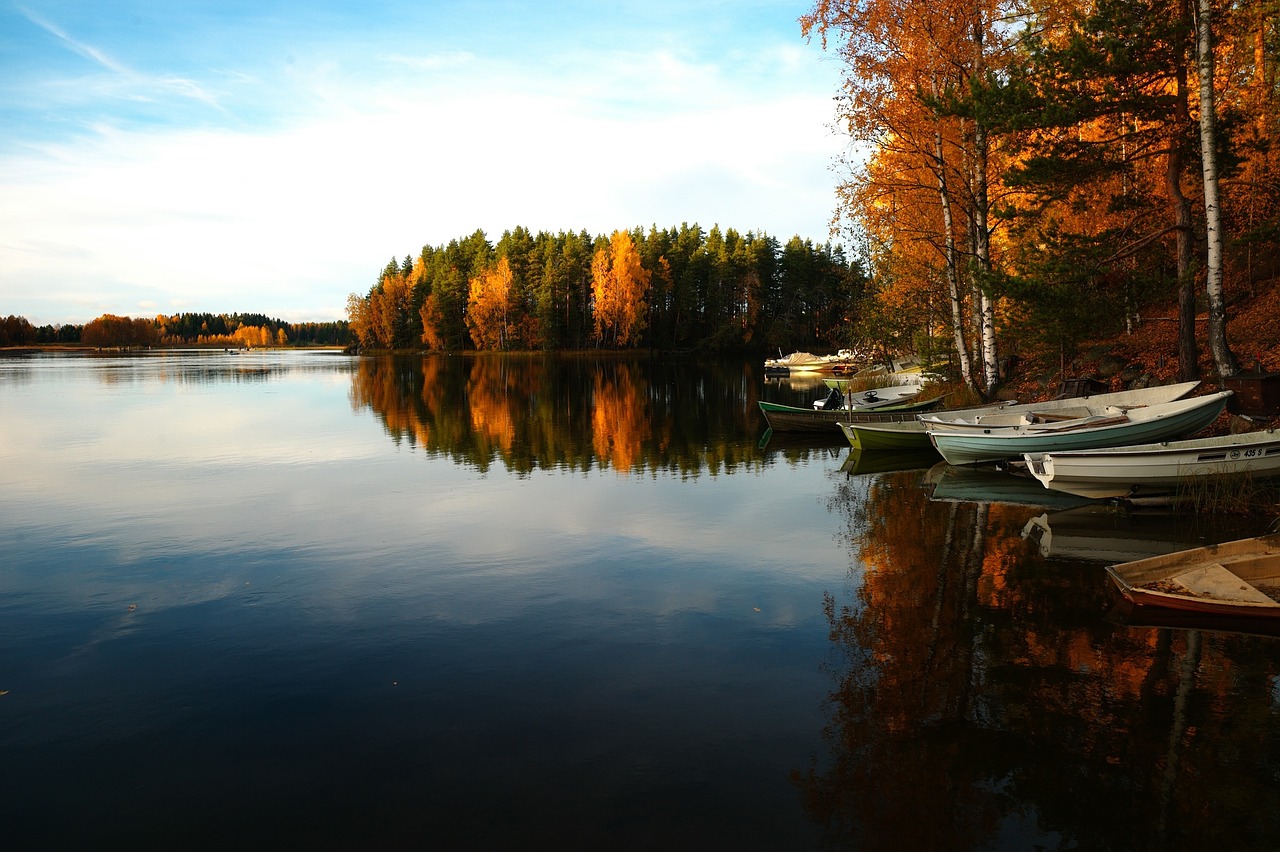
The fall is a time of changing leaves, cooler temperatures and the inevitable week or so of sugar-fuelled delirium that most parents have come to anticipate after an evening of trick-or-treating. Though some would not consider boating with this season of change, for many, boating season doesn’t end just because summer has come and gone. For those of your curious about boating this fall, as well as those of you who continue enjoying fall boating, we’ve compiled a quick list of tips to make sure your boat stays shipshape.
How to Prep for Fall Boating
- Temp and Time: Two things to immediately consider before getting in some fall boating is the temperature change and the waning amount of sunlit hours we can enjoy. As Boating.com suggests, always dress for the water temperature, not the air temperature. Even in waters up to 60ºF can pose risks if you are left stranded for a prolonged period. Wear a waterproof outer layer with multiple water-resistant layers beneath it for best results.
With fewer hours of sunlight, also be sure to check all lights on your vessel and bring a waterproof flashlight with you, even if you don’t anticipate being caught after sundown. Dusk has a tendency of sneaking up on you when boating in the fall.
- Life Jackets Save Lives: Though a safety tip for all seasons, considering the above-mentioned risks of cooler waters make life jackets all the more vital if you fall overboard. Ensure that your life jackets are still in good shape and fit comfortably over your bulkier fall clothing.
Also consider utilizing the likes of personal life beacons (PLB) and emergency position indicating radio beacon (EPIRB), as cell phones can easily become wet and unusable in emergency situations.
- Check, Please: If you had a relatively quiet summer and didn’t take to the water very often, it may be time to run through your commissioning checklist. Though traditionally conducted in the spring, you can easily create an amended version for your fall boating needs, including such essentials as hull assessments, corrosion checks and paperwork reviews.
Though our HQ in the Sunshine State often doesn’t have to worry about cooler weather until we are well into winter, our friends in Virginia and throughout the North can surely use these tips when preparing for some fall boating fun. Always remember, check your vessel before hitting the water, utilize important safety equipment and be prepared for cooler temperatures and shorter days. Stay safe and enjoy the cooler weather while on the water.
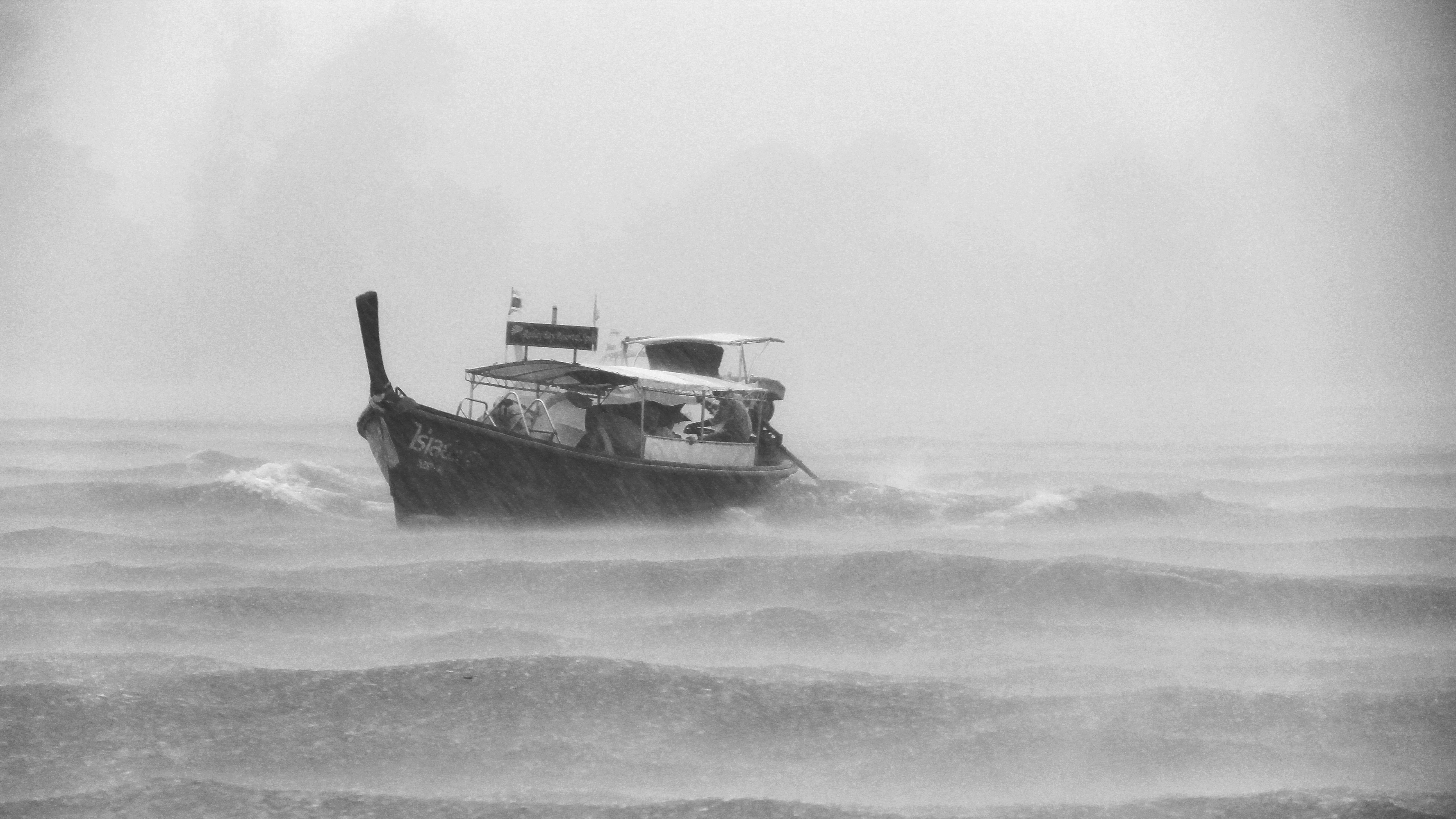
You’ve picked up those pesky groceries you’ve been avoiding getting all week and stroll out of the store to an unwelcome surprise. The sky darkens and, seemingly instantaneously, the rain pours on you, your whole wheat bread and farm-fresh eggs. Being caught in a storm is never fun, but transfer this inconvenience to the open water and amplify the danger caused by heavy rains, high winds and intense lightning.
How Can I Handle Being Caught in a Storm?
- What should I do first if I’m caught in a storm? Remain calm and focus on getting life jackets secured on all passengers and securing your deck by closing all watertight compartments, shutting doors and windows to avoid your ship taking on water. It’s also a smart idea to check your coordinates to assess whether your ship is in danger of running ashore, as well as figure out how best to navigate to safety or, in worst case, know where to report an emergency.
- What should I tell my passengers to do to remain safe on my boat? Get your passengers to either sit low in the boat or remain below deck to avoid the winds and waves knocking them overboard.
- How should I drive my boat in a storm? Your instincts may tell you to jet out of the rough weather as fast as possible, but this is extremely dangerous. Experts recommend slowing to the speed of the sea itself in order to avoid loss of control.
- What do I do if my engine dies after being caught in a storm? If you cannot make it safely to shore and your engine dies, anchor your ship, turn on your lights, secure all emergency safety devices and be ready to radio the coast guard to signal for help if conditions worsen.
If caught in a storm, never panic. Keeping a clear head and relying on training and preparation can save your ship — and maybe even your neck. Do a bit of preparation and always keep a close eye on the weather whenever you hit the water. If you’re concerned about keeping your ship safe when it’s docked, Hi-Tide Boat Lifts can prevent the damage caused by getting caught under or hitting the docks. As always, stay safe and have a fun (hopefully sunny) time on your next boating adventure.
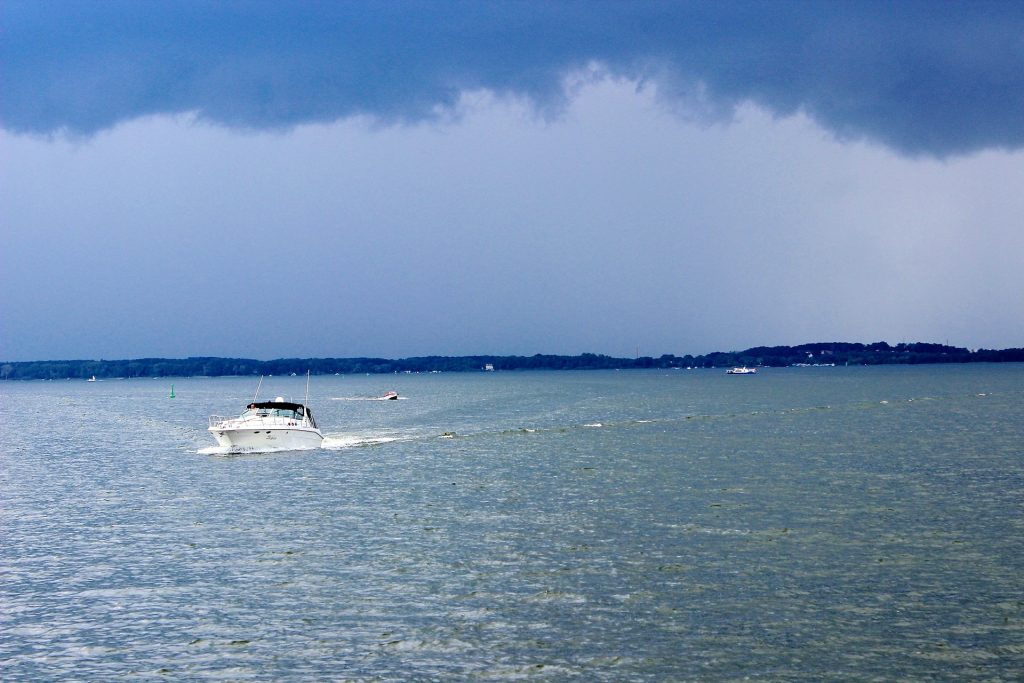
If you are like many boaters (ourselves included), you let very little come between you and a day on the water. Unfortunately, a bout of bad weather can throw a monkey wrench into your plans for a relaxing boating trip. Especially in the summer months, weather can change on a dime.
How to Spot Bad Weather While Boating
- Did I check the forecast? It may seem redundant, but always check the forecast just before embarking on your trip — yes, even if you checked it just the night before. As we all know, meteorology can be a bit of a hit and miss science, and forecasts can change, well, with the weather.
- Can I predict bad weather by looking at clouds? An easy way to get a gauge on the weather is to see if the clouds are flat, puffy, or tall and dark. In general, it’s the taller clouds that can lead to dangerous winds, rain and lightning.
- Where can I listen to weather reports while on the water? Keep tuned to Coast Guard and NOAA Weather Radio All Hazards stations for regular broadcast updates.
- What boating apps can I download to monitor the bad weather? There is a multitude of options when it comes to monitoring the weather on your smartphone. Some popular apps include NOAA SuperRes Radar HD, Skipper, and Boat Weather. There are many free and paid premium choices, so shop around to find the perfect app for your specific needs.
As we often say here at Hi-Tide Boat Lifts, preparation is the key to safety. Always keep the necessary safety gear aboard, complete regular commissioning checklists and continually monitor the forecast before and during your trip for signs of bad weather on the horizon. Though boating is great fun, if there’s even the possibility of bad weather rolling in, it may be better to err on the side of safety and hit the water when you, your passengers and vessels are in the clear.
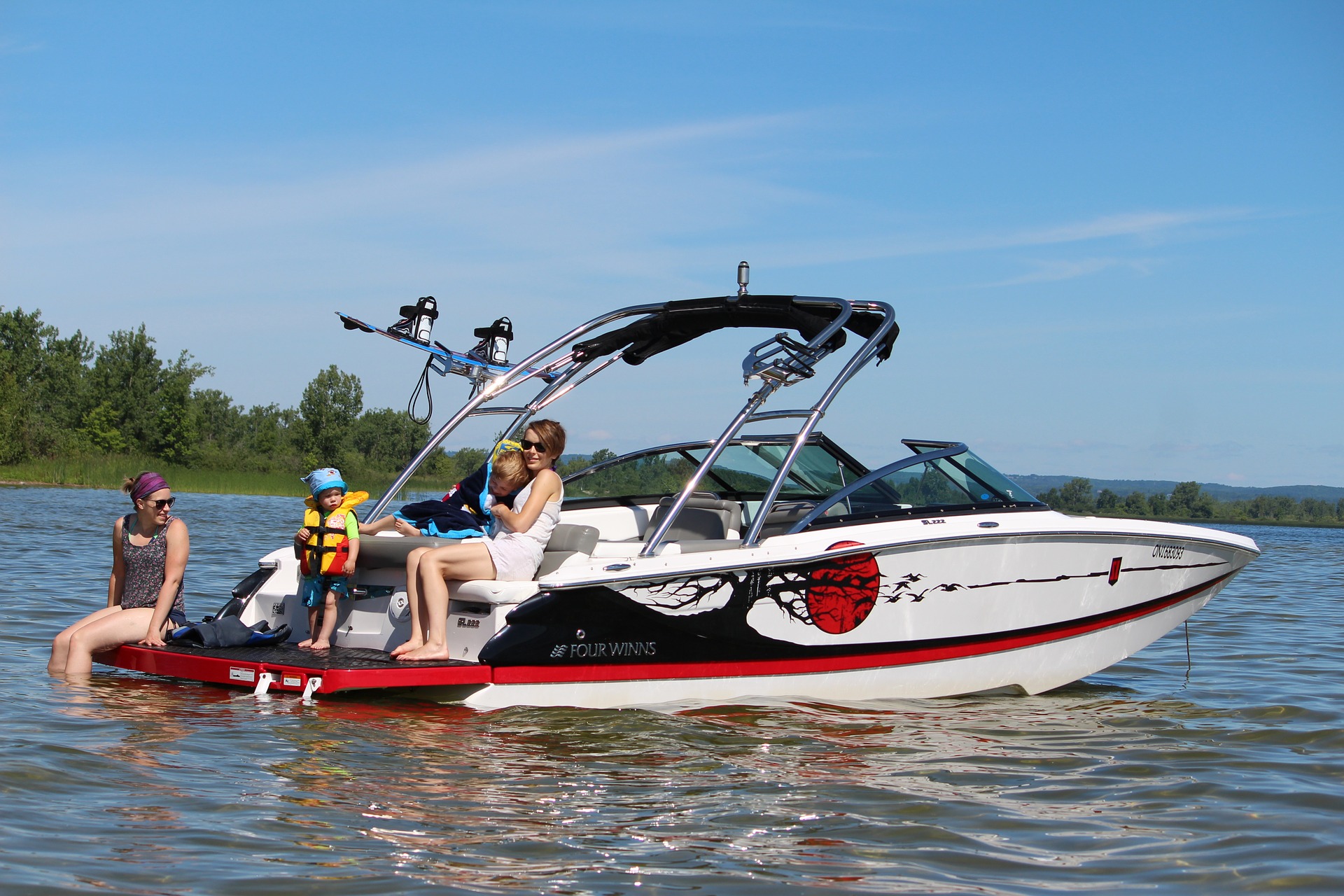
It’s no secret — boaters will find any and every excuse to hit the water for a day of fun with friends and family. Even though any experienced boater has more than a few “valid reasons” why this weekend should be spent cruising down their favorite waterways, we have a few more to add to your list.
Did you know? Boating has some legitimate health benefits you should consider.
The Health Benefits of Boating
- Vitamin D: An unfortunate reality of many Americans’ work lives is that it often involves countless hours under the humming, harsh glow of fluorescent lights. Few of us are fortunate to spend much of our waking hours in the sun, so getting outside after work, while on vacation or on the weekend is definitely a treat. Soaking up the sunshine (safely) can help strengthen bones, fight disease and combat depression.
- A Break from Technology: Though cell phone addiction isn’t officially recognized by the mental health textbooks, it’s a very real phenomenon and one that can cripple us without us even realizing it. If you are constantly palming at your pocket or purse to check your Twitter or Facebook, you may be in need of a little break. Boating in the perfect excuse to put the phone away and live in the moment, enjoying the natural beauty all around you.
- Family Time: There are real health benefits to spending some quality time with friends and family. From stress reduction to contagious healthy habits that your fit friends may impart on you, enjoying time on the water with loved ones is all positive. Also, take into consideration that the health benefits are also shared with those you are spending time with as well, such as your kids, who get more time with Mom and Dad, or your friends, who can be relieved of depression by getting on the water with their buds.
- Fitness: Looking for a low-impact, full-body exercise that is fun to do even on the most sweltering of summer days? Swimming may just be the miracle workout you’re looking for. Even many water sports are great, unconventional ways to stay active and fit while having fun in the sun.
Though you may not need more reasons to take your next boating trip, we hope the above health benefits may help to make convincing your friends or family that it is, indeed, time for another excursion on the water. Stay safe, stay healthy and we’ll see you on the water.






